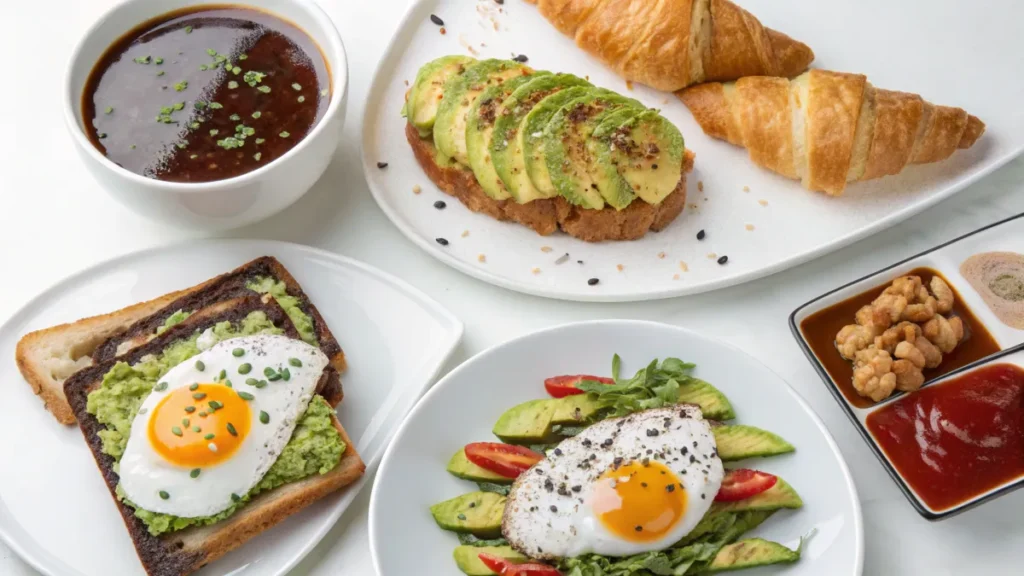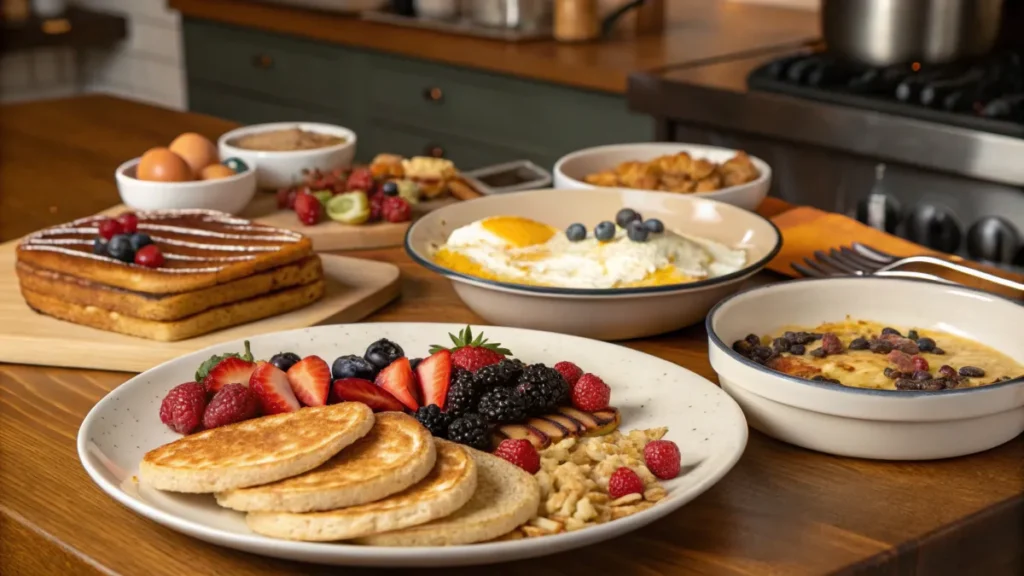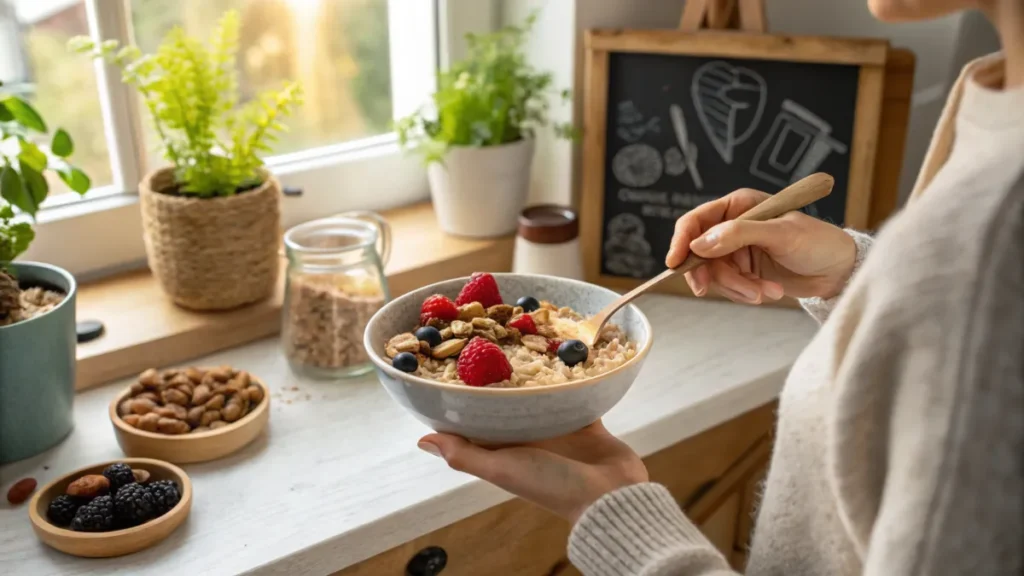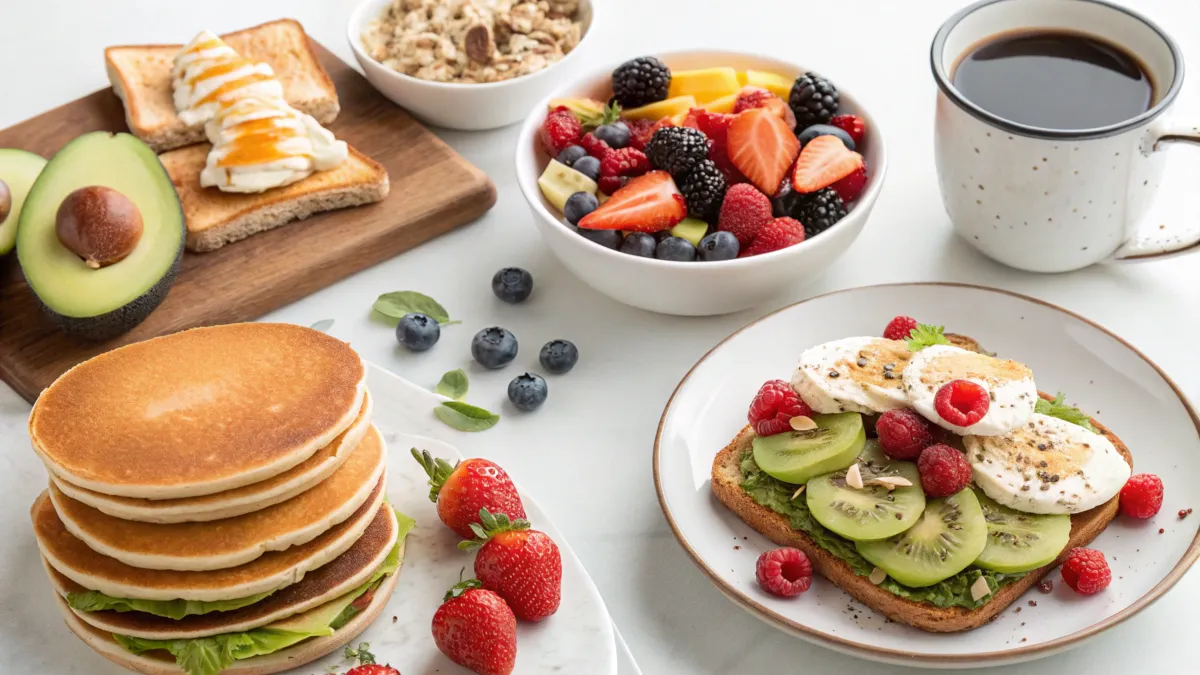Breakfast is often called the most important meal of the day. But What is the Best Daily Breakfast? This article dives into the benefits of eating breakfast, popular options from around the globe, and tips to craft a balanced meal tailored to your lifestyle. We’ll also answer common questions about breakfast and share quick recipes you can try. By the end, you’ll understand why choosing the right breakfast matters and how to make mornings more satisfying.
Table of Contents
Understanding the Importance of Breakfast
Why Breakfast is Called the Most Important Meal of the Day
Eating breakfast sets the tone for the day. It replenishes energy after a night of fasting and provides fuel for your brain and body. Studies show that people who eat breakfast regularly are more likely to have better focus and a balanced mood. Plus, breakfast kick-starts your metabolism, which helps in maintaining a healthy weight.
Skipping breakfast, on the other hand, can make you feel sluggish. It may lead to overeating later in the day because your body craves energy. While some believe skipping breakfast helps with weight loss, research suggests the opposite. A well-balanced breakfast can reduce cravings and stabilize blood sugar levels.
Nutritional Guidelines for a Balanced Breakfast
The key to the best daily breakfast lies in its nutritional balance. A good breakfast includes all three macronutrients: carbohydrates, protein, and fats. Each plays a role in providing sustained energy.
- Carbohydrates: Opt for whole grains like oats or whole-grain bread. They release energy slowly and keep you full longer.
- Protein: Eggs, yogurt, or plant-based options like tofu give your muscles the building blocks they need.
- Healthy Fats: Avocado, nuts, or seeds add a creamy texture and keep you satisfied.
Don’t forget fiber! Adding fruits, vegetables, or nuts can improve digestion. Portion control is also crucial. Eating too much in one sitting can leave you feeling heavy, while too little may leave you hungry too soon.
Popular Types of Daily Breakfasts Around the World

Traditional Breakfast Options by Region
Breakfast styles vary across cultures, but all aim to provide energy for the day ahead. In the U.S., a classic breakfast often includes scrambled eggs, bacon, and toast. These items offer a good balance of protein and carbs. For a sweeter start, pancakes or waffles drizzled with syrup are popular.
Meanwhile, in Asia, breakfast is usually savory and wholesome. For example, in Japan, a traditional breakfast features miso soup, rice, and grilled fish. This meal is rich in nutrients and easy to digest. In India, dishes like idli (steamed rice cakes) or parathas (stuffed flatbreads) are common. These options are flavorful and filling, making them ideal for busy mornings.
European countries bring their own flair to breakfast. France is famous for its buttery croissants and coffee, while Germany favors hearty plates of bread, cheese, and sausages. Each region highlights its local ingredients, making breakfast diverse and exciting.
Healthy International Breakfast Alternatives
If you’re wondering what is the best daily breakfast for health, many international options fit the bill. The Mediterranean breakfast stands out for its simplicity and nutrition. Think fresh yogurt topped with honey, nuts, and seasonal fruits. This combination is both light and satisfying.
In Nordic countries, breakfasts often include rye bread, smoked fish, and boiled eggs. These items are nutrient-dense and promote heart health. Similarly, the Middle East offers a nutritious breakfast called shakshuka. It’s made with poached eggs in a spicy tomato sauce and is usually served with flatbread.
For inspiration and recipes, check out Simply Recipes, which offers a wide range of ideas for international breakfasts.
What Makes a Breakfast “Best” for Your Day?
Tailoring Breakfast to Lifestyle Needs
Your lifestyle plays a big role in determining what is the best daily breakfast. For those who lead an active lifestyle, high-protein options like Greek yogurt with granola or a veggie-packed omelet are great. These choices provide long-lasting energy and support muscle repair.
Busy mornings call for quick yet nutritious options. Overnight oats or smoothies can be prepared in advance and enjoyed on the go. Adding ingredients like chia seeds, bananas, or nut butter ensures a balanced meal without taking much time.
Specific Dietary Considerations
Different diets require different breakfasts. Vegan breakfasts might include tofu scrambles or smoothie bowls packed with plant-based proteins. These meals are vibrant and loaded with nutrients.
For those following gluten-free diets, options like almond flour pancakes or quinoa porridge are excellent. These dishes are naturally gluten-free and easy to customize with toppings like fruits or seeds.
For more recipe ideas that cater to special diets, visit Simply Recipes. The site offers tailored options to suit various dietary needs.
Breakfast Recipes and Preparation Tips

Easy-to-Make Breakfast Recipes
Crafting the best daily breakfast doesn’t have to be hard or time-consuming. Quick recipes can offer great taste and nutrition. Here are two simple options:
- Overnight Oats with Fresh Fruits
Combine oats, almond milk, and a touch of honey in a jar. Let it sit in the fridge overnight. In the morning, top it with fresh berries, bananas, or nuts for a delicious and balanced start to your day. - Smoothie Bowls
Blend frozen fruits like bananas, mangoes, or berries with a splash of milk or yogurt. Pour the thick smoothie into a bowl and add toppings like granola, chia seeds, or shredded coconut for extra crunch.
For more recipe ideas, you can explore this collection of oatmeal recipes on Charmed Recipes.
Tips for Planning Breakfast Efficiently
Planning ahead makes mornings much smoother. Begin by prepping your ingredients the night before. Wash fruits, portion dry ingredients, or even pre-cook certain components like boiled eggs.
Use tools like meal prep containers to keep your ingredients fresh. If you’re short on time, breakfast meal kits or pre-made options like protein-packed baked oatmeal can be lifesavers. Try this protein baked oatmeal recipe for a satisfying and easy morning meal.
FAQs About the Best Daily Breakfast
What Happens if I Skip Breakfast?
Skipping breakfast often leads to feeling low on energy and experiencing mood swings. It may also result in overeating during lunch, which can disrupt your metabolism. Eating a healthy morning meal supports consistent energy levels throughout the day.
Is Eating a Large Breakfast Better Than a Light One?
The answer depends on your activity levels and personal needs. A balanced breakfast with moderate portions is ideal for most people. Large breakfasts can work if you have a physically demanding morning.
What are the Best Breakfasts for Weight Loss?
The best daily breakfast for weight loss should include protein, fiber, and healthy fats. Foods like Greek yogurt, oatmeal with chia seeds, or smoothies with added protein powder are excellent options.
Can Breakfast Improve Mental Performance?
Yes, it can! Breakfast provides glucose, which fuels brain activity. Studies suggest that children and adults who eat breakfast tend to perform better in school and work settings.
Comparing Nutritional Values
Nutritional Comparison of Common Breakfast Choices
When deciding what is the best daily breakfast, it’s important to compare the nutritional value of popular options. Here’s a quick breakdown:
| Food Item | Calories | Protein (g) | Carbs (g) | Fats (g) | Fiber (g) |
|---|---|---|---|---|---|
| Oatmeal + Berries | 150 | 5 | 27 | 3 | 4 |
| Eggs + Avocado Toast | 250 | 12 | 18 | 15 | 5 |
| Smoothie Bowl | 300 | 8 | 40 | 7 | 6 |
| Yogurt + Granola | 200 | 10 | 22 | 6 | 3 |
These choices show how different combinations cater to various dietary needs. If you’re looking for high protein, eggs with avocado toast are ideal. For more fiber, oatmeal with berries stands out.
How to Choose Based on Your Goals
Your breakfast should match your health goals. If weight loss is a priority, focus on lower-calorie, high-protein meals like Greek yogurt with a sprinkle of nuts. If you need sustained energy, opt for complex carbs like oatmeal topped with fresh fruits.
Balancing macros is key to the best daily breakfast. Aim for a mix of protein, fiber, and healthy fats to keep you full and energized.
Breakfast and Its Role in Long-term Health
Link Between Breakfast and Chronic Disease Prevention
A balanced breakfast can do more than fuel your mornings. Studies suggest that people who regularly eat breakfast have a lower risk of heart disease and type 2 diabetes. Nutrient-rich options like whole grains, fruits, and lean proteins contribute to better metabolic health.
Skipping breakfast, on the other hand, can increase insulin resistance over time. This may lead to chronic issues if not addressed. Consuming a meal with plenty of fiber and healthy fats supports heart health and stabilizes blood sugar levels.
Mental Health Benefits of Eating Breakfast
Breakfast isn’t just about physical health; it also impacts your mind. Foods rich in omega-3s, such as nuts or chia seeds, can improve mood and focus. Additionally, including complex carbohydrates can stabilize energy levels, which reduces stress.
Research shows that children and adults who eat breakfast tend to perform better at school and work. They are often more alert, make quicker decisions, and feel less irritable.
For even more nutritious options to support long-term health, explore breakfast ideas like protein-packed oatmeal or Greek yogurt parfaits.
Creating a Sustainable Breakfast Routine

Building Healthy Habits
Finding what is the best daily breakfast involves consistency. A sustainable breakfast routine starts with meal planning. Dedicate a day each week to plan your breakfasts, focusing on variety and nutrition. This not only saves time but also prevents boredom from eating the same meals repeatedly.
Stock your kitchen with staples like oats, eggs, fresh fruits, and healthy fats such as avocados or nuts. These items can be used in multiple recipes, giving you flexibility. Preparing ingredients the night before, such as slicing fruits or portioning oats, makes mornings smoother.
Adapting to Changing Needs
Your breakfast needs may evolve. For instance, if your activity level changes or you adopt a new dietary plan, you’ll need to adjust your meals. If you begin exercising in the morning, a protein-packed breakfast can help with muscle recovery.
Don’t be afraid to experiment with recipes or swap ingredients based on what’s available. For example, quinoa can replace oats, or almond butter can substitute peanut butter. Keeping your routine adaptable ensures that you stick with it long-term.
Conclusion
Why Breakfast Matters Every Day
So, what is the best daily breakfast? The answer varies based on individual needs, but a balanced meal with protein, fiber, and healthy fats is universally beneficial. Breakfast isn’t just about filling your stomach; it’s about starting your day with energy, focus, and a good mood.
Skipping breakfast might save time, but it can lead to overeating later and disrupt your metabolism. On the other hand, a nutritious meal can support weight management, mental clarity, and long-term health.
Taking the First Step
If you’re not in the habit of eating breakfast, start small. A piece of whole-grain toast with almond butter or a simple fruit smoothie can make a big difference. Gradually add variety and experiment with flavors.
Remember, breakfast sets the stage for your day. Whether you’re looking to improve your health, boost energy, or enjoy your mornings, finding the right breakfast routine is key. For more ideas, explore simple recipes that fit your lifestyle, and make breakfast your favorite meal of the day.

